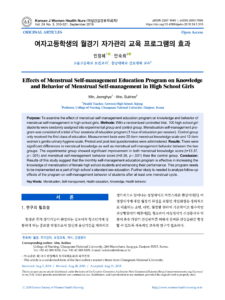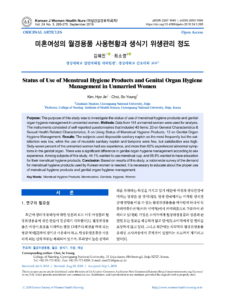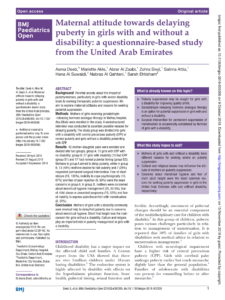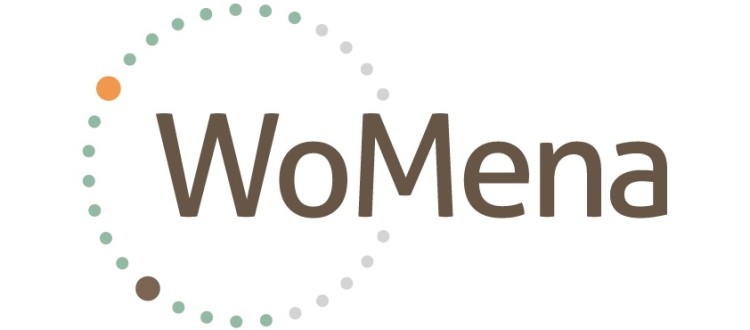Global Reserach Update #15
 Min, J and Ahn, S (2018): Effects of menstrual self-management education program on knowledge and behavior of menstrual self-management in high school girls. A randomized controlled trial with 100 high school girl students in Korea, with half receiving 4 one-hour sessions covering general information about menstruation, pain management, and hygiene, and the other half receiving only general information. Findings were that both menstrual knowledge and menstrual self-management behavior was significantly improved in the experimental group compared to the control group. The study adds to the knowledge about the extent/content of education needed for improved outcomes.
Min, J and Ahn, S (2018): Effects of menstrual self-management education program on knowledge and behavior of menstrual self-management in high school girls. A randomized controlled trial with 100 high school girl students in Korea, with half receiving 4 one-hour sessions covering general information about menstruation, pain management, and hygiene, and the other half receiving only general information. Findings were that both menstrual knowledge and menstrual self-management behavior was significantly improved in the experimental group compared to the control group. The study adds to the knowledge about the extent/content of education needed for improved outcomes.
 Kim, H.J. and Choi, S.Y (2018): Status of use of menstrual hygiene products and genital organ hygiene management in unmarried women. A study based on self-reporting by 161 unmarried women in Korea. Findings were that most 82.1% used disposable pads, but this product received low satisfaction rates. Only few (17.1%) used reusable sanitary napkin and tampons, but satisfaction was high. 44.1% of respondents wanted to use menstrual cups. 98.8% of the participants also wanted education for their menstrual hygiene products, and 78.3% of respondents reported using between 11 and 20 menstrual products during menstruation. Furthermore, 83.2% of the respondents believed menstrual hygiene products would affect women’s reproductive health very much. The study adds to the understanding of acceptability and satisfaction for different products
Kim, H.J. and Choi, S.Y (2018): Status of use of menstrual hygiene products and genital organ hygiene management in unmarried women. A study based on self-reporting by 161 unmarried women in Korea. Findings were that most 82.1% used disposable pads, but this product received low satisfaction rates. Only few (17.1%) used reusable sanitary napkin and tampons, but satisfaction was high. 44.1% of respondents wanted to use menstrual cups. 98.8% of the participants also wanted education for their menstrual hygiene products, and 78.3% of respondents reported using between 11 and 20 menstrual products during menstruation. Furthermore, 83.2% of the respondents believed menstrual hygiene products would affect women’s reproductive health very much. The study adds to the understanding of acceptability and satisfaction for different products
 Deeb, A et al. (2018): Puberty attitude towards delaying puberty in girls with and without a disability: a questionnaire-based study from the United Arab Emirates. A questionnaire-based study of 42 mother-daughter pairs in Mafraq hospital in the United Arab Emirates, to explore the reasons for seeking medical treatment to delay or halt puberty. Findings were that the main concern for mothers of girls without disability was fear of short stature (100%). For mothers of girls with a disability, the main reason was concerns about menstrual hygiene management (92.5%), following by fear of child abuse or unwanted pregnancy (55%). Moreover, 26% of mothers of girls with a disability requested permanent surgical intervention. This study particularly adds to the understanding of concerns regarding menstruation for of mothers of girls with disabilities.
Deeb, A et al. (2018): Puberty attitude towards delaying puberty in girls with and without a disability: a questionnaire-based study from the United Arab Emirates. A questionnaire-based study of 42 mother-daughter pairs in Mafraq hospital in the United Arab Emirates, to explore the reasons for seeking medical treatment to delay or halt puberty. Findings were that the main concern for mothers of girls without disability was fear of short stature (100%). For mothers of girls with a disability, the main reason was concerns about menstrual hygiene management (92.5%), following by fear of child abuse or unwanted pregnancy (55%). Moreover, 26% of mothers of girls with a disability requested permanent surgical intervention. This study particularly adds to the understanding of concerns regarding menstruation for of mothers of girls with disabilities.

